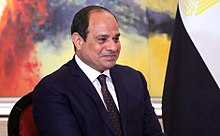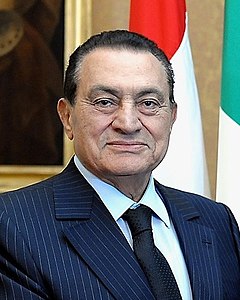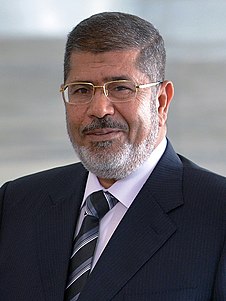President of Egypt
| President of the Arab Republic of Egypt | |
|---|---|
 Presidential Standard | |
 Incumbent Abdel Fattah el-Sisi since 8 June 2014 | |
| Residence | Heliopolis Palace, Cairo, Egypt |
| Term length | Four years renewable once |
| Inaugural holder | Muhammad Naguib 18 June 1953 |
| Salary | E£900,000 (approx. US$47,000) annually[1] |
| Website | www.presidency.gov.eg |
Egypt |
|---|
 |
This article is part of a series on the politics and government of Egypt |
Constitution .mw-parser-output .noboldfont-weight:normal (history) |
Government
|
Legislature
|
Judiciary
|
Administrative divisions
|
Elections
|
Political parties (former) |
Foreign relations
|
|
The President of the Arab Republic of Egypt (Arabic: رئيس جمهورية مصر العربية) is the head of state of Egypt. Under the various iterations of the Constitution of Egypt, the president is also the Supreme Commander of the Armed Forces and head of the executive branch of the Egyptian government. The current president is Abdel Fattah el-Sisi, in office since 8 June 2014.
Contents
1 History
1.1 Old electoral system
1.2 2005/2007 constitutional amendments
2 Presidential powers
3 Requirements to hold office
4 Election
4.1 Candidacy
5 Presidential campaign
5.1 Presidential Election Commission
5.2 Inauguration and oath of office
5.3 Term(s) of office
5.4 Succession
5.5 Resignation
5.6 Official residences
6 Living former Presidents
7 See also
8 References
9 External links
History
| This article is part of a series on |
| Life in Egypt |
|---|
Culture |
|
Society |
|
Politics |
|
Economy |
|
Egypt portal |
The first president of Egypt was Muhammad Naguib, one of the leaders of the Egyptian Revolution of 1952. He took office on 18 June 1953, the day on which the constitutional monarchy of Egypt was overthrown.
Following the 2011 Egyptian revolution, Hosni Mubarak, who held office from 14 October 1981 until 11 February 2011, was forced to resign following calls for his removal from office. On 10 February 2011 Mubarak transferred presidential powers to then-Vice President Omar Suleiman, briefly making Suleiman de facto president.[2] Following Mubarak's resignation, the position of President of Egypt was officially vacated and the Supreme Council of the Armed Forces, led by Field Marshal Mohamed Hussein Tantawi, assumed executive control of the state.[3] On 30 June 2012, Mohamed Morsi was sworn in as President of Egypt, having won the 2012 Egyptian presidential election on 24 June.[4]
Old electoral system

Presidential Standard, 1972–1984
The Egyptian Constitution has had various forms since its 1953 change to become a republic. Under the 1980 amendments of the 1971 Egyptian Constitution, the president of the republic was elected indirectly in a two-stage system unique to Egypt. The People’s Assembly, the lower house of Parliament, nominated one of a number of candidates for the presidency. A candidate needed at least a two-thirds majority in the People’s Assembly in order to win the nomination. In the second stage, the candidate was confirmed in office by popular plebiscite.
2005/2007 constitutional amendments
This section's tone or style may not reflect the encyclopedic tone used on Wikipedia. (February 2011) (Learn how and when to remove this template message) |
In 2005 and 2007, constitutional amendments were made. Principles in the amended constitution include:
- The election of the president of the republic by direct secret ballot from among all citizens who have the right to vote.
- Ensuring that multiple candidates be put forward for the people to choose from.
- Ensuring the credibility of the nomination process.
- Providing the opportunity for political parties to put forward one of their leaders to contest the first presidential elections to be held in light of the amendment.
- The establishment of a presidential election commission that would enjoy complete independence to supervise the election process.
- Carrying out the election in a single day.
- Ensuring judicial supervision over the voting process.
The following provisions regarding the election process are stipulated in Article 76 as amended:
A successful candidate must be elected by the majority of the votes. If no candidate attains such a majority, elections will be repeated after at least seven days between the two candidates having the highest votes. In case of a tie between the candidate who attained the second highest votes and a third candidate, the third candidate shall participate in the second round. The candidate who receives the highest votes in the second round shall be declared president.
The amendment also provides that a law will be passed to regulate the relevant election procedures. This law is expected to regulate the various aspects of the election process itself, including campaign funding, equal access to the media, and guarantees of fair competition.
As required by the amendment, the law will be submitted to the Supreme Constitutional Court to opine on its constitutionality. This establishes an important precedent in Egypt’s legal tradition, by which the Supreme Constitutional Court shall have the right of prior review of national legislation to decide on its compatibility with the Constitution. This differs from the practice thus far by which the review process undertaken by the Court on national legislation was done by judicial review subsequent to the passage of legislation.
Presidential powers
Under the system created by the 1980, 2003 and 2007 constitutional amendments to the 1971 Constitution, the President is the pre-eminent executive figure, who names the Prime Minister of Egypt as well as appoints the Cabinet per the latter's recommendation, while in reality, was the head of both the state and of the government, aside from being the top foreign policy maker and holding supreme command over the military. During martial law, the President also anoints deans of faculties and majors, and can also enlist or oust people in the private sector. He or she then also has the power to issue regulations for the enforcement of laws,
ensuring proper public services, etc., which have been transferred to the Prime Minister under the 2012 and 2014 Constitutions.[citation needed] Egypt had been under martial law since 1981.[citation needed] After the Egyptian revolution in 2011 - 2012, that ousted the 30-year regime of then President Hosni Mubarak, the martial law was suspended.
The 2012 Constitution, provides for a semi-presidential form of government in which the President shares executive powers with the Prime Minister. And this was retained under a new Constitution that was ratified on 2014, one year after a military coup ousted the country's first democratically elected President, Mohamed Morsi in a coup due to his dictatorial tendencies and the leader then of the ruling military junta, then Defense Minister and Field Marshal Abdel Fattah el-Sisi, suspended the 2012 Constitution. Sisi was elected President of Egypt under the 2014 Constitution, months after it was ratified.
Under the present 2014 Constitution, the President is the head of state as well as that of the executive. He or she lays down, alongside with the Prime Minister and the Cabinet, the state's general policy and oversees its implementation, represents Egypt in foreign relations and has the power to ratify treaties, can issue decrees having the force of law when the House of Representatives is in recess and such decrees is subject for approval by the House after resuming its sessions at the end of the recess and acts as the supreme commander of the armed forces. He or she has also the power of pardon.
Requirements to hold office
Article 141 of the Egyptian Constitution establishes the requirements one must meet in order to become president. The president of the republic should: be an Egyptian citizen, be born to Egyptian parents (never having dual nationality), have participated in the military or be exempted from it and cannot be less than 40 years old.[5]
Election
Election procedures are taken before the end of the incumbent president’s term by 60 days.
Candidacy
Additional requirements were provisioned in Article 142 of the Egyptian constitution concerning candidates for the president's office.[5]
- Candidates must have the recommendation of 20 members of the House of Representatives or the endorsement of 25,000 people across 15 governorates, with at least 1,000 signatures from each.[5]
Presidential campaign
Presidential Election Commission
The amendment to Article 76 of the constitution provides for the establishment of a “Presidential Election Commission” that would have complete independence, and would be charged with the supervision of the presidential election process.
The Commission will be composed of 10 members, presided by the Chief Justice of the Supreme Constitutional Court and four other ex officio members of the judiciary who are the most senior serving Deputy President of each of the Supreme Constitutional, the Court of Cassation, and the High Administrative Court, and the president of the Cairo Court of Appeal.
The rest of the Commission will be made up from five independent and neutral public figures: three to be selected by the Peoples Assembly and two to be selected by the Shoura Council.
Decisions of this Committee shall be passed by a majority of seven votes. This Commission will have a term of five years and will be exclusively competent to supervise the presidential election process, including accepting nominations, announcing the names of accepted candidates, supervision of election procedures, vote counting and announcement of the results.
It will also have final judicial competence to rule on any contesting or challenge submitted in relation to the presidential elections, and its decision will be final and subject to no appeal. The Committee will issue its own regulations and shall be competent to establish general sub-committees from among members of the judiciary, to monitor the various phases of the election process, under its supervision. The election process will be completed in one day.
Inauguration and oath of office
In accordance with Article 79 of the constitution, the president must take the following oath or affirmation before exercising his functions:
"I swear by Allah The Almighty to sincerely maintain the Republican system, to respect the Constitution and law, to fully care about the interests of the people, and to maintain the independence and territorial integrity of the Homeland."
Term(s) of office
Under the Constitution, the president serves for a term of four years. He is limited to two terms, whether successive or separated. For example, if incumbent President Sisi had been unsuccessful in his bid for reelection in 2018, he would have been eligible to run again in 2022, and if successful would have had to leave office for good in 2022.
During his tenure in office, the president is not allowed to be a formal member of a political party.
If the president-elect is announced before the end of the incumbent president’s term, the incumbent president continues in office until the end of his term.
Succession
In the case of temporary incapacitation of the president, the constitution provides the president to relinquish his powers to the Prime Minister. However the person who takes office is limited in power as the new president can not dissolve the parliament, propose constitutional amendments or remove the cabinet from office.
In case of the vacancy of the presidential office or the permanent incapacitation of the President, the Speaker of the People’s Assembly shall temporarily assume the presidency. In case the People’s Assembly is dissolved at such a time the President of the Supreme Constitutional Court shall take over the presidency on condition that neither shall nominate himself for the presidency. Both are also limited in power as in they can not dissolve the parliament, remove the cabinet, or propose constitutional amendments.
The People’s Assembly shall then proclaim the vacancy of the office of President, and a new president shall be chosen within a maximum period of sixty days from the date of the vacancy of the office.
The constitution does not directly stipulate any role for the Prime Minister in the process of presidential succession, when the former post of Vice President still existed it was a tradition for the People's Assembly to nominate the vice-president for the vacant office of the president. Both Sadat and Mubarak served as vice-presidents at the time the presidential office became vacant, however on Mubarak's succession in 1981 as president he did not appoint a vice-president until 29 January 2011 when during substantial protests demanding reforms he appointed Omar Suleiman to the role.[6]
Resignation
President Gamal Abdel Nasser submitted his resignation after the overwhelming Egyptian defeat in 1967 war with Israel, before returning to office after mass demonstrations by the Egyptian public.[7] President Mubarak also resigned on 11 February 2011 after eighteen days of protest against his regime.
The president may resign by delivering his resignation to the People's Assembly under the 2012 and 2014 Constitutions.[8]
Official residences
The Presidency in Egypt controls 8 presidential residences in addition to other presidential guest houses. Egypt's official residence and office of the president is Heliopolis Palace in Cairo. Other presidential palaces include:
Abdeen Palace, in Old Cairo, Cairo.
Koubbeh Palace, in Cairo.
Ras Al-Teen Palace, in Alexandria
Montaza Palace, in Alexandria- Al-Tahra Palace, in Cairo
- Al-Oroba Palace, in Cairo
Living former Presidents
There are two living former Egyptian Presidents:

Hosni Mubarak
(served 1981–2011)
(1928-05-04) 4 May 1928

Mohamed Morsi
(served 2012–2013)
(1951-08-08) 8 August 1951
See also
List of heads of state of Egypt, for a comprehensive list of Egyptian heads of state since 1805- List of Presidents of Egypt
- List of Presidents of Egypt by time in office
- Prime Minister of Egypt
- List of rulers of Egypt
References
^ Wahab, Abdel (2013-12-01). "President to receive legal maximum wage". The Cairo Post. Retrieved 2014-01-19..mw-parser-output cite.citationfont-style:inherit.mw-parser-output .citation qquotes:"""""""'""'".mw-parser-output .citation .cs1-lock-free abackground:url("//upload.wikimedia.org/wikipedia/commons/thumb/6/65/Lock-green.svg/9px-Lock-green.svg.png")no-repeat;background-position:right .1em center.mw-parser-output .citation .cs1-lock-limited a,.mw-parser-output .citation .cs1-lock-registration abackground:url("//upload.wikimedia.org/wikipedia/commons/thumb/d/d6/Lock-gray-alt-2.svg/9px-Lock-gray-alt-2.svg.png")no-repeat;background-position:right .1em center.mw-parser-output .citation .cs1-lock-subscription abackground:url("//upload.wikimedia.org/wikipedia/commons/thumb/a/aa/Lock-red-alt-2.svg/9px-Lock-red-alt-2.svg.png")no-repeat;background-position:right .1em center.mw-parser-output .cs1-subscription,.mw-parser-output .cs1-registrationcolor:#555.mw-parser-output .cs1-subscription span,.mw-parser-output .cs1-registration spanborder-bottom:1px dotted;cursor:help.mw-parser-output .cs1-ws-icon abackground:url("//upload.wikimedia.org/wikipedia/commons/thumb/4/4c/Wikisource-logo.svg/12px-Wikisource-logo.svg.png")no-repeat;background-position:right .1em center.mw-parser-output code.cs1-codecolor:inherit;background:inherit;border:inherit;padding:inherit.mw-parser-output .cs1-hidden-errordisplay:none;font-size:100%.mw-parser-output .cs1-visible-errorfont-size:100%.mw-parser-output .cs1-maintdisplay:none;color:#33aa33;margin-left:0.3em.mw-parser-output .cs1-subscription,.mw-parser-output .cs1-registration,.mw-parser-output .cs1-formatfont-size:95%.mw-parser-output .cs1-kern-left,.mw-parser-output .cs1-kern-wl-leftpadding-left:0.2em.mw-parser-output .cs1-kern-right,.mw-parser-output .cs1-kern-wl-rightpadding-right:0.2em
^ "Egypt crisis: Army in pledge to end state of emergency". BBC News. 11 February 2011. Retrieved 11 February 2011.
^ "Egypt's Mubarak resigns as leader". BBC News. 11 February 2011. Retrieved 11 February 2011.
^ "Muslim Brotherhood's Morsi becomes Egypt's first civilian president". The Christian Science Monitor. 24 June 2012.
^ abc "Egypt's newly-approved constitution to be followed by tackling key political laws". Ahram Online. 19 January 2014. Retrieved 19 January 2014.
^ McGreal, Chris; Ian Black (3 February 2011). "Mubarak deputy insists president will not bow out before (hi) Egyptian elections". The Guardian. Retrieved 28 August 2012.
^ Aburish, Said. Nasser: The Last Arab. St. Martin's Press, 2004. pp.268–269
^ Article 151 in the Constitution of Egypt
External links
- The Egyptian President
- Egypt’s Second Republic

